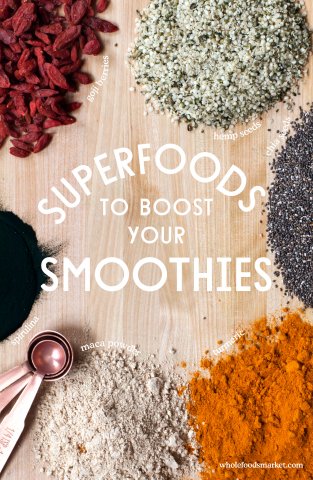Unlike high fiber or mise en place, there is no true scientific or culinary definition for the term superfood. In fact, this popular group of foods with a lengthy list of purported health claims is sometimes shunned by nutrition experts (myself included!) because it elevates certain foods in the popularity contest while ignoring other less exotic, beautiful or virtuous ingredients. Not one to pit one ingredient over another, we selected several foods we think are super — not to be used exclusively or at the expense of the rest of your spice rack and produce crisper — because they are minimally processed and are nutrient-dense or packed with a few nutrients. These are great additions to your repertoire. (But please don’t ignore your celery and smoked paprika! Variety is the spice of life, and that is super indeed.)
Turmeric: This vivid orange powder (from a root that looks like a small orange cousin of fresh ginger) is loaded with iron. One teaspoon of ground turmeric (which could fit nicely in a veggie smoothie) has 1.65 grams of iron: almost one-tenth of your daily needs. That little spoon also has nearly three-fourths a gram of fiber and little sodium or calories to boot.
Spirulina: Scientists are hard at work determining the healthy benefits (if any) from consuming this seaweed derivative. However, we can confirm it works and tastes just fine in smoothies when using the dried powdered option. Additionally, one tablespoon of dried spirulina contains a whopping four grams of protein and two grams of iron (both boons for vegetarians or vegans!) plus small amounts of B vitamins for just 20 calories.
Goji berries: We like the dried option of these vibrant red, sweet-tart berries — also known as wolfberries — for a snack (try them as an alternate for golden raisins) or tossed in a smoothie or hot cereal. Even though they are not the fountain of youth, these berries pack a nutritional punch: Two tablespoons of the berries contain loads of vitamin A, plus small amounts of iron, protein and fiber.
Hemp seeds: An old favorite for smoothies or hot cereals, this seed delivers a complete protein (if you like to keep track!) full of essential fatty acids (as in, the ones we have to eat because our body can’t produce them). Three tablespoons of the nutty-tasting seeds contain 9 grams of protein, 11 grams of heart-healthy polyunsaturated fats and about 1 gram of iron. In addition, those tiny seeds contain some magnesium, iron and zinc.
Maca powder: This mild-tasting powder comes from a Peruvian root long used for medicinal purposes. Most of its touted powers are from stories and not science (at least not yet!). But you can still use this powder to great effect in smoothies. One teaspoon of the powder contains some carbohydrate; small amounts of fiber, potassium and iron.
Lucuma powder: Here’s another super ingredient from South America that offers a sweet deal for smoothies. Two teaspoons provide 2 grams of fiber for just 20 calories. The powder, made from a South American fruit, is a tasty addition to your pantry.
Chia seeds: These teeny seeds have a huge amount of fiber, which is why chia seeds plus liquid result in a pudding-like gel. But that’s not all: One ounce (nearly 7 teaspoons) has almost 10 grams fiber, 6.5 grams polyunsaturated (healthy) fats, about 4.5 grams protein and 140 calories along with smaller amounts of iron, zinc and calcium. Use these tasteless seeds in smoothies, granolas or hot cereals.


